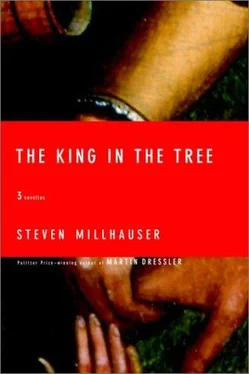Steven Millhauser
The King in the Tree
This is the hall. It isn’t much of a one, but it does the job. Boots here, umbrellas there. I hate those awful houses, don’t you, where the door opens right into the living room. Don’t you? It’s like being introduced to some man at a party who right away throws his arm around your shoulders. No, give me a little distance, thank you, a little formality. I’m all for the slow buildup, the gradual introduction. Of course you have to imagine it without the bookcase. There isn’t a room in the house without a bookcase.
May I take your coat? Oh, I like it. It’s perfect. And light as a feather. Wher ever did you find it? It’s so hard to know what to wear this time of year, warm one day cold the next. I worry about my jonquils. They came out last week and then wouldn’t you know it: snow. Luckily it didn’t stick. It’s a miracle they didn’t die. I’ll just hang it right here, next to mine. It must look very empty to you, all those hangers side by side. Those are my late husband’s hats. Funny. One day I cleared out all the coats, all the shoes and galoshes — it just seemed pointless. But I left the hats. I couldn’t touch the hats.
This used to be my favorite room. Listen to me! Used to be. But that’s the way it is, you know. I don’t have a favorite room anymore. Still, I spend most of my time here. Where else would I go? I’m so glad you like it. One thing we always agreed on, my husband and I, was furniture: it had to be comfortable. As Robert put it, no matter how new it was, it had to look sat in. And of course the piano — what’s a living room without a piano, I’d like to know. Not that I ever touched it. No, I gave up piano at twelve. Don’t know why, really. It’s the sort of thing you later think you regret, without really regretting it. But Robert, now. He quit lessons at fifteen but kept on practicing. He never did like to give anything up.
It’s a warm room too. When we bought the place it was a little drafty in winter, but first we insulated and then we replaced those drafty old windows that Robert had to put up every fall. Triple-track: it made a difference, let me tell you. When you close the curtains, in cold weather, it’s just as if you’re sealing yourself in. I’d sit on the couch with my feet tucked under, reading, while Robert sat in the chair there, by the bookcase, reading and marking passages. Or we’d talk— you know, thoughts drifting up, turning into words, like, I don’t know, like a way of breathing. Sometimes he made a fire in the fireplace — excellent draft. I meant to tell you I had the chimney cleaned only last month. Was that ever a job. You wouldn’t believe what was in there. I almost fell over when I saw the bill. But hey, can you blame the poor guy? Anyway. When the fire was going, I’d move to that end of the couch, to be near it. I could feel the heat all along my right side. Sometimes Robert would go over to the piano, if the mood struck him. He never played for anyone except me. This wasn’t exactly as romantic as it sounds. He called himself an amateur —harsh word for Robert — said he refused to destroy beautiful things in public. Robert never liked to make mistakes. It upset him. He played for me because he knew I wouldn’t mind an occasional wrong note. Or you could say he played for himself and allowed me to overhear him. But I loved to hear him play, especially his Chopin nocturnes. He was crazy about Chopin, said he was the greatest composer — not ever, but of piano music. Second was Mozart. He’d play those Mozart sonatas over and over — every single one of them. Do you know what he’d do? He’d begin with any sonata and play right through the book, in order, till all of a sudden — right in the middle of a movement — the middle of a phrase — he stopped. “That’s enough of that!” he’d say, as though he were angry at himself, or. . or disappointed. Robert was hard on himself. You had to know when to soothe him and when to leave him alone. Men are harder on themselves that way than women, don’t you think? Or am I wrong? But when he played, he was able to lose himself for a while, in the music. So imagine a fire going— wood snapping the way it does when it’s a little green — the wind rattling the windows behind the curtains — and one of those Chopin melodies that feel like sorrow and ecstasy all mixed together pouring from the keys — and you have my idea of happiness. Or just reading, reading and lamplight, the sound of pages turning. And so you dare to be happy. You do that thing. You dare.
I hope you don’t mind these little. . anecdotes of mine. We can just breeze on through the house if you’d rather. Then it’s all right to continue?
Well. I don’t want you to think of me sitting on that couch for twenty-two years with a look of blissful idiocy on my face. You know, the adoring wife and the happy hubby. Twenty-two years! That was how long Robert and I were married: twenty-two years. Things are bound to be a little imperfect, in twenty-two years. I met him when I was twenty-four, working in a bookstore in Vermont. Robert was thirty. Even back then he had that gloomy kind of handsomeness that just. . slayed me. A handsome moody man. Doomed, as he was fond of saying. Difficult, was what it boiled down to. Robert was difficult. But you work your way through. Besides, I was a handful myself, back then. Demanding. Temperamental. Robert was very patient. Impatient with himself and others, patient with me. We. . fell in love, as they say. And stayed there. That was the thing. And I knew him: God, did I know him. I was a student of his expressions, a scholar of his moods. I don’t know when it was, exactly, that I felt something was wrong. It was last year — spring was further along, half my forsythias dead. You remember that late frost. I was sitting on the couch with a book, after dinner, and Robert was sitting in his chair, with a book facedown on his leg, thinking. Brooding, you could say. For no particular reason I asked myself: Am I happy? And I felt a little pause, a little — oh, breath of hesitation, before I answered: Well, yes, of course I’m happy. Of course I am. Happy.
What stayed with me was that blink of hesitation. Robert had been acting a little strange lately. I’d noticed it without noticing it, the way you do. His work wasn’t going well again, he was — I mean, all this was nothing new. But there was a new element, something I was suddenly aware of. Robert was very good at giving you his full attention. I’ve never known anyone who was so good at giving you their full attention that way. He would listen with a kind of. . a kind of alertness, and whatever he said would be at the center of what you were talking about. I realized that I’d missed this for a while — that his deepest attention was elsewhere. Now, listen. There was no question of unfaithfulness between Robert and me. I knew Robert. It wasn’t the sort of thing he did. Not that he didn’t notice a pretty woman. He liked pretty women. He liked me, didn’t he? Was always talking about how pretty I was and all that; I didn’t deny it. And of course women were always noticing him. But noticing’s one thing, and Robert. . it wasn’t his way. It just wasn’t in the bounds of possibility. Besides, we were happy. Weren’t we? But I found myself thinking, on the couch — or not really thinking, it was more like the shadow of a thought: could it be that Robert. .? I immediately felt embarrassed, almost. . ashamed, as if I’d been caught in some unpleasant act. But there it was. The little thought-shadow.
Читать дальше












